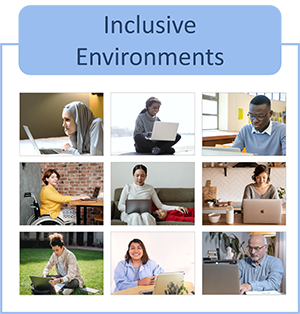Difference between revisions of "Equitable Teaching Practices"
| Line 16: | Line 16: | ||
[[File:Logo-COEP.png|center|alt=CALA Online Equity Project]] | [[File:Logo-COEP.png|center|alt=CALA Online Equity Project]] | ||
<big><p>In the Spring of 2021, Durham Tech's Creative and Liberal Arts Department (CALA) created a task force to explore best practices for inclusive and equitable online teaching. The task force worked to acquire research-based information and strategies and coined this undertaking the CALA Online Equity Project. The content provided within these pages is intended to provide faculty with knowledge, recommendations, and examples of equitable teaching practices that can be implemented in their own online classes.</p></big> | <big><p>In the Spring of 2021, Durham Tech's Creative and Liberal Arts Department (CALA) created a task force to explore best practices for inclusive and equitable online teaching. The task force worked to acquire research-based information and strategies and coined this undertaking the CALA Online Equity Project. The content provided within these pages is intended to provide faculty with knowledge, recommendations, and examples of equitable teaching practices that can be implemented in their own online classes.</p></big> | ||
| − | |||
===What is implicit bias? How does it affect instruction?=== | ===What is implicit bias? How does it affect instruction?=== | ||
<big> | <big> | ||
Revision as of 18:29, 6 July 2021
Introduction
In the Spring of 2021, Durham Tech's Creative and Liberal Arts Department (CALA) created a task force to explore best practices for inclusive and equitable online teaching. The task force worked to acquire research-based information and strategies and coined this undertaking the CALA Online Equity Project. The content provided within these pages is intended to provide faculty with knowledge, recommendations, and examples of equitable teaching practices that can be implemented in their own online classes.
What is implicit bias? How does it affect instruction?
- Who Me? Biased? video series New York Times series introducing implicit bias
- Russell McClain's TED Talk: Implicit Bias, Stereotype Threat and Higher Education (11:15 min)
- Ismini Vasileiou’s TED Talk: Unconscious Bias: Confronting Stereotypes (8:26 min)
- Vist Harvard's Project Implicit to take one or more confidential Implicit Association Tests. A variety of topics are presented, and the results of the tests can provide information that may help you reflect on your attitudes or beliefs regarding your selected topic.
Strategies for Equitable Teaching
| Inclusive Environments | Social Presence | Equitable Grading Practices |
|---|---|---|

|

|

|
Discipline-Specific Equitable Teaching Guidance
Click an icon below to learn more about creating an equity-advancing educational environment for a specific discipline. Supervisors may find this Getting Started with Equity: A Guide for Academic Department Leaders online resource helpful.
| Psychology | English Composition | Chemistry | Biology | Math |
|---|---|---|---|---|

